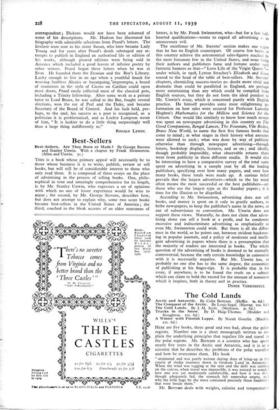Best-Sellers
Best-Sellers. Are They Born or Made ? By George Stevens and Stanley Unwin. With a chapter by Frank Swinnerton. (Allen and Unwin. 5s.) THIS is a book whose primary appeal will necessarily be to those whose business it is to write, publish, review or sell books, but will still be of considerable interest to those who only read them. It is composed of three essays on the place of advertising in the process of selling books. One, philo- sophical in tone and amazingly comprehensive for its length, is by Mr. Stanley Unwin, who expresses a set of opinions with which no one of lesser experience would be wise to argue ; the second, by Mr. George Stevens, describes how, but does not attempt to explain why, some two score books became best-sellers in the United States of America ; the third, couched in the bleak accents of an elder statesman of
letters, is by Mr. Frank Swinnerton, who—but for a few half. hearted qualifications—seems to regard all advertising at an unnecessary evil.
The excellence of Mr. Stevens' section makes one regret that he has no English counterpart. Of course few books in this country achieve the astronomical sales-figures reached by the most fortunate few in the United States, and none bring their authors and publishers fame and fortune under such fantastic banners as that—" Love Life of the Virgin Queen under which, in 1928, Lytton Strachey's Elizabeth and Essex soared to the head of the table of best-sellers. Mr. Stevens'
chapters, chronicling success-stories no doubt more vivid and
dramatic than could be paralleled in England, are perhaps more entertaining than any which could be compiled from English sources, but they do not form the ideal pendant to Mr. Unwin's essay, which is concerned purely with English practice. He himself provides some most enlightening in-
formation on how sales were secured for Professor Lancelot
Hogben's Mathematics for the Million and Science for the Citizen. One would like similarly to know how much money was spent on newspaper advertising in this country on The Good Companions, Bengal Lancer, The Fountain, Vile Bodies, Brave New World, to name the first five famous books that
come to mind ; at what stages in their history what amounts were allotted to each ; what was done by way of publicity otherwise than through newspaper advertising—through letters, bookshop displays, lectures, and so on ; and ideally,
though probably impossibly, what observable returns there were from publicity in these different media. It would also
be interesting to have a comparative survey of the total sums
spent on advertising in a sample year by all the leading publishers, specifying over how many papers, and over how many books, these totals were made up. A curious belief prevails that the largest advertisers—which to the lay mind often means the most successful or the best publishers—are those who use the largest type in the Sunday papers ; it is time for the illusion to be dispelled.
According to Mr. Swinnerton, advertising does not sell books, and money is spent on it only to gratify authors, to bribe newspapers, to keep the publisher's name in the news, or out of subservience to convention. Mr. Unwin does not support these views. Naturally, he does not claim that adver- tising alone can sell a book at a profit, and he condemns excessive and indiscriminate advertising as emphatically as even Mr. Swinnerton could wish. But there is all the differ- ence in the world, as he points out, between strident huckster-
ing in popular journals, and a policy of moderate and intelli- gent advertising in papers where there is a presumption that the majority of readers are interested in books. The whole question of the advertising of books is doomed to be eternally controversial, because the only certain knowledge in connexion with it is necessarily negative. But Mr.. Unwin has, as probably no one else has to the same degree the economics of publishing at his finger-tips. It is probable that in his essay, if anywhere, is to be found the truth on a subject which can claim to hold the record for the amount of nonsense which it inspires, both in theory and in practice.
DEREK VERSCHOYLE.








































 Previous page
Previous page